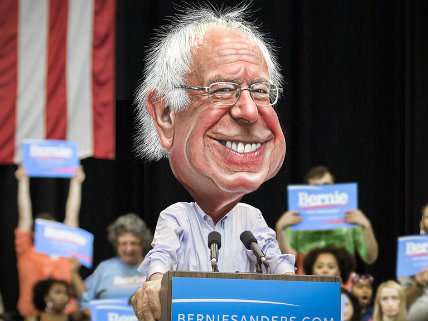Corporate Political Spending Is Helping Bernie Sanders Succeed. Why Does He Want To Ban It?
To progressive campaign finance reformers, freedom of speech depends on who you are or what you say.

Hillary Clinton and Bernie Sanders are both running for president while at the same time calling for a constitutional amendment that would change the laws governing our elections. It's an unusual situation in that if either of them manage to get elected, it would actually weaken the case for enacting the amendment they favor.
Senator Sanders' campaign web site says, "Oil companies, pharmaceutical manufacturers, Wall Street bankers and other powerful special interests have poured money into our political system for years. In 2010, a bad situation turned worse. In a 5-4 decision in the Citizens United case, the Supreme Court opened the floodgates for corporations and the wealthy to spend unlimited and undisclosed money to buy our elected officials."
If these bankers and oil companies are so politically influential, how is it that Senator Sanders is leading in the Iowa and New Hampshire polls by double digit margins? Maybe the influence of corporate cash on elections isn't as big a problem as Sen. Sanders and Clinton claim, since Sanders is winning even though he is not a big favorite of investment bankers, oil companies, or pharmaceutical manufacturers. Though there's a mischievous alternative possibility, too, one that really has the potential to reframe the debate on what the Clinton campaign, in a press release last week, called "the stranglehold that wealthy interests have over our political system." Maybe what has pushed Sanders over the top in Iowa and New Hampshire is corporate political spending.
Ben & Jerry's, an ice cream brand with historical roots in Sanders' home state of Vermont, has been using its stores and website as a platform for a political campaign against free trade. That carries its own irony, because Ben & Jerry's is a global brand available from Singapore to Sweden, owned by the European consumer products conglomerate Unilever. Yet Ben & Jerry's has aligned with Sanders—and against the Republican Congressional leadership and President Obama—in opposing fast-track presidential negotiating power for the trade deal known as the Trans-Pacific Partnership. "Secret TPP deal equals climate meltdown," the Ben & Jerry's web site proclaims, urging customers to write Congress opposing the free trade deal.
If it's not Ben & Jerry's anti-trade politicking making the difference for Mr. Sanders, perhaps it's the political activism of Amalgamated Bank. This bank boasts that it "publicly endorsed President Obama in the last presidential election." Signs in the windows of the bank's branches urge support for a $15 an hour minimum wage — legislation that Sanders supports. The bank's website features an elaborate section urging customers to write Congress in support of a $15 minimum wage.
Or maybe it is the shoe and fashion company Kenneth Cole whose support has put Mr. Sanders in the lead. Sanders has long been a supporter of gay rights; as a congressman in 1996, he voted against the Defense of Marriage Act that President Clinton signed into law. Kenneth Cole has used its corporate marketing budget to purchase billboard advertising in support of gay marriage.
In fairness to Sanders and Clinton, it's not only Democrats who want laws to restrict political speech. The Citizens United decision was one in which the Supreme Court struck down parts of the Bipartisan Campaign Reform Act of 2002. That act was signed into law by a Republican president, George W. Bush, who had sworn to protect and defend the Constitution that included the First Amendment. The 2002 campaign-speech-limitation legislation was also known as McCain-Feingold, after its champion Senator John McCain, who was the Republican Party's presidential candidate in 2008.
Election lawyers may quibble about the supposed distinction between "electioneering communication"or "express advocacy" of the sort at issue in Citizens United and the mere "issue advocacy" or petition-type language of the sort that is of issue in most of the examples involving Ben & Jerry's, Amalgamated Bank, and Kenneth Cole. It strikes me as an awfully fine distinction; both forms of political communication are protected by the First Amendment's freedoms of speech and of petition.
Perhaps the progressive politicians will eventually come around to the idea that if they can manage to get elected under the existing rules, those rules aren't so bad, after all. Otherwise, they'll be stuck trying to rewrite the First Amendment in a way that will prohibit politicking by oil companies, investment banks, and pharmaceutical companies but that will allow similar activity by international ice cream companies, labor-union-controlled banks, and the fashion industry. In other words, freedom of speech would depend on who you are or what you say. That isn't really freedom at all. It is, however, good reason to be suspicious of presidential candidates running on promises to rescind a part of the Bill of Rights.


Show Comments (32)